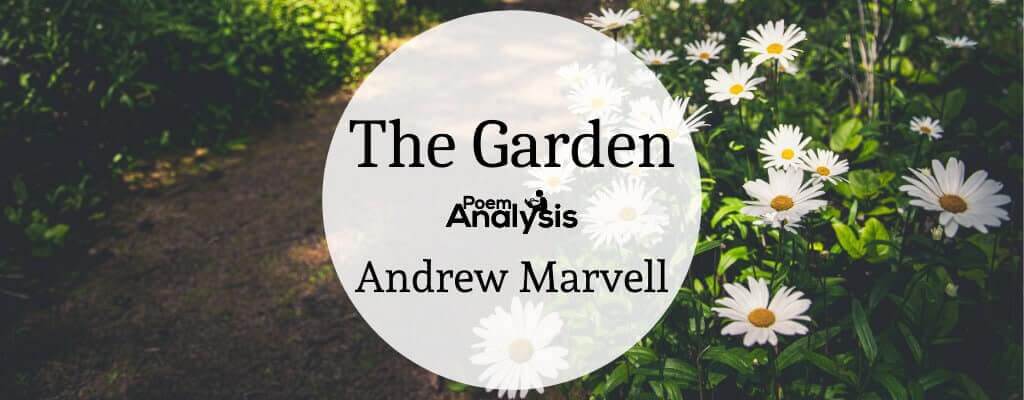The real objective of Andrew Marvell in writing ‘The Garden’ seems to have been to establish the superiority of a contemplative life over a life of action. True contemplation, according to the poet, is possible only in the green shade of a tree in a garden. A garden offers quiet and repose; and here one can enjoy the pleasures of the mind and soul as well as the pleasures of the sense. A life of action, on the other hand, is futile, and men make a mistake in spending their time in feverish endeavors in order to win honors in different fields of life.
The Garden Andrew MarvellHow vain-ly men themselves amazeTo win the palm, the oak, or bays,And their uncessant labours seeCrown’d from some single herb or tree,Whose short and narrow verged shadeDoes prudently their toils upbraid;While all flow’rs and all trees do closeTo weave the garlands of repose.Fair Quiet, have I found thee here,And Innocence, thy sister dear!Mistaken long, I sought you thenIn busy companies of men;Your sacred plants, if here below,Only among the plants will grow.Society is all but rude,To this delicious solitude.No white nor red was ever seenSo am’rous as this lovely green.Fond lovers, cruel as their flame,Cut in these trees their mistress’ name;Little, alas, they know or heedHow far these beauties hers exceed!Fair trees! wheres’e’er your barks I wound,No name shall but your own be found.When we have run our passion’s heat,Love hither makes his best retreat.The gods, that mortal beauty chase,Still in a tree did end their race:Apollo hunted Daphne so,Only that she might laurel grow;And Pan did after Syrinx speed,Not as a nymph, but for a reed.What wond’rous life in this I lead!Ripe apples drop about my head;The luscious clusters of the vineUpon my mouth do crush their wine;The nectarine and curious peachInto my hands themselves do reach;Stumbling on melons as I pass,Ensnar’d with flow’rs, I fall on grass.Meanwhile the mind, from pleasure less,Withdraws into its happiness;The mind, that ocean where each kindDoes straight its own resemblance find,Yet it creates, transcending these,Far other worlds, and other seas;Annihilating all that’s madeTo a green thought in a green shade.Here at the fountain’s sliding foot,Or at some fruit tree’s mossy root,Casting the body’s vest aside,My soul into the boughs does glide;There like a bird it sits and sings,Then whets, and combs its silver wings;And, till prepar’d for longer flight,Waves in its plumes the various light.Such was that happy garden-state,While man there walk’d without a mate;After a place so pure and sweet,What other help could yet be meet!But ’twas beyond a mortal’s shareTo wander solitary there:Two paradises ’twere in oneTo live in paradise alone.
Summary
‘The Garden’ by Andrew Marvell illustrates the calm and pleasant beauty of a garden. The poetic persona seems to be walking in a garden one day. As he walks, he finds heavenly beauty emanating from the trees, herbs, and flowers. In this world where all things are prone to decay, the beauty of nature remains constant. The eternal beauty of her gardens makes the poet thoughtful about the beauty of biblical paradise. It seems that the poet wants to say, “Heaven is here, in this world, not there in your imaginary heaven!”
The poem progresses with its own pace like a man walking through a garden waiting and feeding himself with what he observes. The scenic magnificence of the garden is an added gift with the description that the poet illustrates.
Themes
‘The Garden’ by Andrew Marvell captures the themes of natural beauty, poetic imagination, and spirituality. Here in this poem, Marvell seems to be a priest of nature. He finds himself in an ambiance that gives a soothing sensation to his soul. He cherishes each moment in the slow journey through the garden. It is not that the subject matter of the poem only revolves around the garden. The poet captures nature as a whole and the garden is a part of it.
By using his poetic imagination, Marvell simply mesmerizes the readers. His illustration is a sculpture of his poetic imagination and genius. He goes beyond the stock metaphors and imagery. The metaphysical elements come along as he weaves his verse. He presents the worldly garden in a way that seems it is one of the heavens in the earth. As there are many such gardens, there are several other abodes on the earth too. Last but not the least, the theme of spirituality comes knocking at the mind’s door. The beauty of the garden helps the poet to attain a state of trance. The poem is nothing but a spiritual contemplation on the grace of the garden.
The Garden Analysis
Stanza One
How vainly men themselves amaze
To win the palm, the oak, or bays,
And their uncessant labours see
Crown’d from some single herb or tree,
Whose short and narrow verged shade
Does prudently their toils upbraid;
While all flow’rs and all trees do close
To weave the garlands of repose.
How futile are the endeavors of men by means of which they simply go crazy in order to win a crown of the leaves of a palm-tree or an oak-tree or a laurel tree for their military, or civic, or poetic achievements? They perform unceasing (or endless) labors in order to obtain a crown of leaves from a single tree or herb. The short and ever-narrowing shades of these trees wisely rebuke such men for their hard labors; while all flowers and all trees act unitedly to weave garlands with their shades, these garlands being the garlands of rest and tranquillity and therefore far superior to the garlands or crowns of leaves which those men seek.
Stanza Two
Fair Quiet, have I found thee here,
And Innocence, thy sister dear!
Mistaken long, I sought you then
In busy companies of men;
Your sacred plants, if here below,
Only among the plants will grow.
Society is all but rude,
To this delicious solitude.
Fair Quiet, I have found you here in this garden; and I have found here your dear sister, Innocence, also. For a long time I made the mistake of seeking you both in the company of busy men. But, if at all your sacred plants grow here on the earth, they grow only among the plants of a garden and not in places crowded with human beings. The company of human beings is nothing but barbarous as compared with this enjoyable solitude in the garden.
Stanza Three
No white nor red was ever seen
So am’rous as this lovely green.
Fond lovers, cruel as their flame,
Cut in these trees their mistress’ name;
Little, alas, they know or heed
How far these beauties hers exceed!
Fair trees! wheres’e’er your barks I wound,
No name shall but your own be found.
Neither the whiteness of the complexion nor the redness of the lips of ladies has ever been known to be so loving as the lovely green color of the plants and leaves in a garden. Doting lovers, who are as cruel in their actions as the flame of love which torments them, show their cruelty by carving the names of their sweethearts with knives on the barks of trees. It is regrettable that either these lovers are not quite aware of, or they do not pay enough attention to, the fact that the beauties of a garden are far more attractive than the beauties of their ladies. So far as I am concerned, O fair trees, wherever I happen to make use of a knife to cut into your barks, I shall carve no woman’s name there but only your own names.
Stanza Four
When we have run our passion’s heat,
Love hither makes his best retreat.
The gods, that mortal beauty chase,
Still in a tree did end their race:
Apollo hunted Daphne so,
Only that she might laurel grow;
And Pan did after Syrinx speed,
Not as a nymph, but for a reed.
When our love has run its course, and our passion has been exhausted, we can withdraw into a garden for rest and refreshment. Or, when Cupid, the god of love, is not actively at work to people fall in love, he withdraws into a garden for relaxation. The gods who run after earthly women, whom they think beautiful, find that their chase has ended in their getting hold of trees instead of women. For instance, god Apollo ran after the nymph, Daphne, not in order that he should hold the laurel tree into which Daphne was to be transferred. Similarly, god Pan hotly pursued the nymph Syrinx not in order to satisfy his lust but because he wanted to get hold of a reed into which that nymph was to be metamorphosed.
Stanza Five
What wond’rous life in this I lead!
Ripe apples drop about my head;
The luscious clusters of the vine
Upon my mouth do crush their wine;
The nectarine and curious peach
Into my hands themselves do reach;
Stumbling on melons as I pass,
Ensnar’d with flow’rs, I fall on grass.
What a wonderful time I am having in this garden! Ripe apples hang downwards from the trees so as to touch my head. The delicious bunches of grapes growing on the vines come into such close contact with my lips, I walk, that their juice enters my mouth. The nectarines and the exquisitely-formed peaches come into my hands of their own accord, without my making any effort whatsoever. The melons grow on the ground in such plenty that, as I walk on, my feet strike against them and my walking is obstructed; and, entangled among the flowers, I fall down on the grass.
Stanza Six
Meanwhile the mind, from pleasure less,
Withdraws into its happiness;
The mind, that ocean where each kind
Does straight its own resemblance find,
Yet it creates, transcending these,
Far other worlds, and other seas;
Annihilating all that’s made
To a green thought in a green shade.
While my body remains on the grass, my mind withdraws itself from the body because it is not interested in the lesser or inferior pleasures offered by the fruits. My mind seeks the happiness of a different kind which originates from the mind itself. The mind is like an ocean where each creature living on the land has a counterpart in water. However, the mind can also create altogether different lands and different oceans which quite surpass the real lands and real oceans. The mind reduces everything that has been created to nothingness, giving rise to fresh and vigorous thoughts in the shade of a green tree.
Stanza Seven
Here at the fountain’s sliding foot,
Or at some fruit tree’s mossy root,
Casting the body’s vest aside,
My soul into the boughs does glide;
There like a bird it sits and sings,
Then whets, and combs its silver wings;
And, till prepar’d for longer flight,
Waves in its plumes the various light.
Here in ‘The Garden’, close to fountains, where my feet slip on account of the wetness of the ground, or, close to some fruit trees the lower parts of the trunks of which are covered with moss, my Soul discards the outer garment of the body and goes noiselessly into the branches of the trees. There, on the branches, my Soul sits like a bird and sings; then my Soul preens and combs its bright wings as a bird does; and finally, having prepared itself for a longer flight waves the manifold light in its wings.
Stanza Eight
Such was that happy garden-state,
While man there walk’d without a mate;
After a place so pure and sweet,
What other help could yet be meet!
But ’twas beyond a mortal’s share
To wander solitary there:
Two paradises ’twere in one
To live in paradise alone.
Here I find myself in the same happy state in which Adam was when in the Garden of Eden he walked alone, without a companion. When he found himself in such a pure and sweet place, no comparison could have been appropriate for him. Or, finding himself in such a pure and sweet place as the Garden of Eden, Adam could not have wished for any companion, and no companion could have suited him. But it was not the happy lot of a mortal to be allowed to roam about along in that place. Had he continued to live alone in the Gardens of Eden, he would have enjoyed the happiness of two Paradises – one, the Paradise which was the Garden of Eden, and second, the Paradise of being alone.
Stanza Nine
How well the skillful gard’ner drew
Of flow’rs and herbs this dial new,
Where from above the milder sun
Does through a fragrant zodiac run;
And as it works, th’ industrious bee
Computes its time as well as we.
How could such sweet and wholesome hours
Be reckon’d but with herbs and flow’rs!
How skillful was the gardener who made the flowers and plants grow here in such a manner and according to such a pattern that they collectively serve as a sun-dial. The rays of the sun fall on this sun-dial with diminished heat after passing through the green leaves which may be compared to the Signs of the Zodiac— Zodiac is the name given to that belt of the heavens, which includes all the apparent positions of the sun and planets. And the hard-working bee, while at work, is able to calculate the passing of time as correctly as we human beings can, by consulting this sundial. After all, how the passing of such sweet and refreshing hours could be calculated in the garden except by means of the sun-dial formed by plants and flowers.





The poem analysis is such a useful website for all literature lovers as well as for academic purposes too. Thanks for all the deep and thorough analyses and interpretations of the plethora of poems. Much grateful for your endeavor.
You’re welcome! We have received a lot of flack recently so it is nice to garner a bi of praise! Thank you.
Thanx a lot
You’re welcome
thanks a lot for this summary it helped me alot
You’re very welcome, glad we could help!
Thank you it helped me alott.